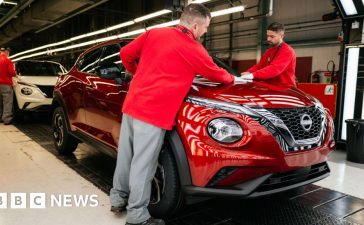
image:
(From left) Launching the inaugural technology roadshow at NTU campus today were NTUitive board member Mr Chew Sutat, Chairman, Shan De Advisors Pte Ltd; Mr David Toh, CEO, NTUitive; Guest-of-Honour Ms Low Yen Ling, Minister of State for Trade and Industry, and Culture, Community and Youth; Vice President (Innovation and Entrepreneurship) Prof Louis Phee; and NTUitive board member Dr Stanley Lai, Partner, Allen & Gledhill LLP.
Credit: NTU Singapore
Over 60 start-ups, spin-offs and disruptive innovations were showcased today at the Nanyang Technological University, Singapore (NTU Singapore) inaugural technology roadshow.
They are part of the 330 start-ups and deep tech spin-offs which the University has successfully incubated in less than a decade, of which 70 are deep tech spin-offs and 260 are startups.
Deep tech spin-offs are often founded by NTU faculty and researchers and linked to Intellectual Property (IP) generated from the University’s research. These 70 spin-offs have a combined value of over $820 million, based on their last funded valuations. Start-ups are usually founded by students and alumni with a good business idea that usually may not involve IP developed by the university.
Open to the public, the roadshow is a key event of the NTU Innovation and Entrepreneurship initiative, launched earlier this year in March, which aims at nurturing innovation, accelerating research commercialisation and grooming an entrepreneurial spirit within the NTU community.
Themed “Igniting Innovation”, the event marks the beginning of the next phase of NTU’s journey to create high-quality start-ups and nurture an entrepreneurial mindset.
It features many unique technologies, impactful inventions, start-ups and intellectual properties generated by the University, engaging a wider audience including industry, investors, venture capitalists and NTU alumni.
Gracing the occasion today as Guest-of-Honour was Ms Low Yen Ling, Minister of State for Trade and Industry, and Culture, Community and Youth. Ms Low is also the Mayor of the Southwest District and an NTU alumna.
In the spotlight are some of NTU’s top deep tech spin-offs, which boast world-leading technologies across diverse domains such as Artificial Intelligence (AI), machine learning, biotechnology, robotics, space, and sustainability solutions.
Organised by NTUitive, NTU’s innovation and enterprise company, the event gave both start-ups and spin-offs a platform to pitch and present their solutions to the roadshow attendees, increasing their visibility and creating investment opportunities.
Vice President (Innovation and Entrepreneurship) Prof Louis Phee said that by showcasing successful ventures in addition to the Intellectual Properties available for license by companies, the roadshow will help the University generate more economic and social impact for Singapore.
“We want companies to see which of our technologies can help them improve their businesses or to better their product offerings, thus increasing their market competitiveness globally. We also want to inspire and ignite the entrepreneurial spirit of the NTU community, as we need to groom the next generation of inventors and disruptive innovators,” Prof Phee added.
Fostering a thriving innovation and entrepreneurial ecosystem is well aligned with the NTU 2025 strategic plan, which prioritises research and innovations that can address some of humanity’s most pressing challenges, including sustainability, climate change and population health.”
Since the launch of the NTU 2025 in 2021, the University has been ramping up its research commercialisation and licensing technologies to local and international companies, as well as nurturing more entrepreneurial teams to form spin-off companies.
Last year, the University filed 518 technology inventions and disclosures and licensed over 140 of them – a 40 per cent increase when compared to five years ago. Over the last decade, NTU has reviewed over 1,500 technology disclosures and licensed to companies more than 800 intellectual properties, including patents.
Forming a strong pipeline of research and innovation is crucial for Singapore, as it transforms into a knowledge-intensive and innovation-driven economy, where its companies can create globally competitive products, services and business models.
Promising technologies, start-ups and spin-offs showcased
Among the top spin-offs at the showcase is ACM Biolabs, a biotechnology firm that has a proprietary nanoparticle delivery platform that be used to create vaccines and drug-delivery systems for multiple applications.
For instance, not only can their artificial cell membranes be used to quickly create booster vaccines for new COVID-19 variants – which recently passed Phase 1 clinical trials — but also deliver drugs to treat cancers and eye diseases. Their polymer carrier particles are akin to a delivery package that can contain many different types of drug molecules or proteins, delivered to the desired target organ or tissues in a human body.
Another promising start-up targeting human health and well-being is MindSigns Health, which uses a cloud-based platform to analyse electroencephalogram (EEG) waveforms for patients with epilepsy or life-threatening neural conditions, allowing secure access to real-time monitoring by doctors anytime and anywhere in the world.
Other uses of their technology include the remote monitoring and assessment of mental health so that doctors can monitor and track their patients’ recovery progress online, thus improving the outcomes of treatment and standard of care given.
Over in the sustainability and clean energy sector, battery technology spin-off VFlowTech recently bagged US$10 million to scale up its production of Vanadium Redox Flow (VRF) batteries, which is a longer-lasting, safer and affordable alternative to current Li-ion batteries.
As the positive and negative poles of the batteries are in liquids kept in separate compartments, VRF batteries can be recharged tens of thousands of times without losing performance, have a very low risk of a battery fire, and can store large amounts of energy. It is also low-cost, thus making it perfect for large-scale energy grid applications, storing electricity with intermittent renewable energy from solar, wind and tidal generators.
***END***











